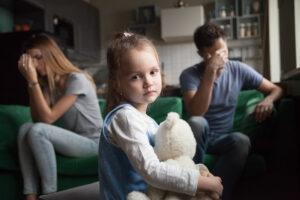
How to Make Divorce Easier on Kids
- posted: Oct. 15, 2019
Going through a divorce can be so all-consuming that it’s easy to lose perspective on how kids suffer when their parents break up. While you can’t take away all their pain, you can cushion it by following a few recommended practices.
A key component in helping children cope with divorce is communication. For younger kids, keep the message simple and reassuring: that Mommy and Daddy are going to live in different houses but both will still be part of the children’s day-to-day lives. For older ones, emphasize and repeat often that they are not responsible for the divorce. Children, who are taught early on that their bad behavior has negative consequences, may blame themselves for the breakup of their family. They hesitate to blame their parents, whom they consider as embodiments of correct conduct. There needs to be active intervention and positive reinforcement to alter this perception of guilt. You should research helpful resources online and, if needed, work with a family therapist.
In addition to communicating a positive message, try not to air grievances in front of your children or otherwise bring conflict into their home. Sometimes divorcing parents antagonize each other using the children as pressure points. One way to avoid this pitfall is to move away from a win/lose mentality. Even when you are at your angriest, think about what you could do next that would most benefit your children. That may mean giving up on minor points about visitation or drop-off/pickup times if it avoids a screaming match in front of the kids. For chronic problems with visitation or other changes that deviate significantly from your parenting plan, talk to your lawyer for help and advice.
Also, avoid placing your children at the center of any conflict. You don’t need to give your child paperwork to deliver to your spouse. Mail it or hand deliver it yourself. You should never ask a child to pass on a verbal message either; instead, send a text message or email, which has the added benefit of documenting the communication.
Children feel a wide range of emotions during a divorce, including sadness, loss, guilt, anger and, sometimes, relief. Ideally, both you and your spouse will reassure them that you love them, will continue to support them and will provide stability in their school and social lives. Children who feel secure and loved are best equipped to adapt to changes in their home life stemming from their parents’ divorce.
If you have questions about a divorce involving children, contact Scottsdale divorce attorney Clark & Schloss Family Law, P.C. for a consultation at our Scottsdale office. You can reach us by phone at 602-789-3497 or contact us online.



